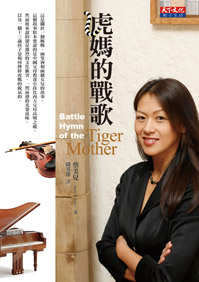A week after it was published in the Review section of The Wall Street Journal, Amy Chua’sessay arguing the superiority of strict Chinese parenting continues to stir debate. The argument–whether Chua’s approach to raising kids (no TV, no school plays, no grade lower than an A) is a tough-minded response to a culture of chronic underachievement or some form of well-intentioned-but-misguided child abuse–has generated 4,000 comments on wsj.com, more than 100,000 comments on Facebook, and dozens of response articles elsewhere on the English-speaking Internet, including this moving testimonial from tech entrepreneur Christine Lu.

- Erin Patrice O’Brien for The Wall Street Journal
But how has the essay been received in China?
At first glance, it seems obvious that Ms. Chua’s ideas should find supporters in China, and not just because of shared cultural roots. Unlike in the U.S., higher education in China is considered a highly precious resource, available to a minority and accessed for most by means of an intensely competitive national exam. Add to that the pressures of the one-child system, and you have the perfect recipe for hard-line parenting.
Yet many in China, especially in the middle class, have begun to develop an interest in the more free-wheeling child-rearing practices of the West, seen as producing more creative, socially capable and happier children.
A selection of comments left by readers in response to a translated summary of the Chua essay on WSJ’s Chinese site reflects something of this conflict:
Isn’t this how American elites are produced? If you don’t eat bitterness, then how do you achieve? Just sit there and wait for meat pies to drop from Heaven? – “Pushi Dahuyou”
I think strictness is necessary, depending on the phase. When they’re little, children have a lot of bad habits and you have to be hard in pointing those out because otherwise they don’t understand their mistakes. When they’re a little older, you guide them gently because by that point they’re already capable of thinking for themselves. — php1988
Educating a child is like raising a tree. If it grows straight, you don’t bother with it, but if it grows crooked, you have to control it. If you just let it go, it might get all twisted, and by the time it’s fully grown all you have is a piece of conceptual art. Also: Contemporary Chinese mothers are progressing with the times, not like before when all they knew how to do was beat their children into doing their homework. The problem is now the school’s are crap!!! – whuto
It’s exactly because of this b.s. style of education that China still has a feudal-slave culture…That’s what distinguishes Chinese people, absolutely no creativity. – jameszog
This kind of mother must have a lot of self-loathing and insecurity, depending on her daughters to make herself feel better. This used to be common in China, but it’s slowly changing. The rules most parents set are not as unreasonable as those the mother in this essay has. – “strongly disagree”
This Chinese mother has abandoned the teachings of her ancestors: “Creating without owning, working without taking credit, leading without dominating, this called primal virtue.” –Tao Te China, Chapter 10. – koalatrader
In the U.S., it doesn’t take that much effort to live carefree and happy. The welfare system is good, and goods are cheap. You can get by. Not in China. With this many people, and everything undeveloped, Chinese people have work themselves close to death. – qq982838075
There are problems with translation here. Professor Chua is an “ethnic Chinese mother,” not “mother from China.” Professor Chua is the child of ethnic Chinese who immigrated to the U.S. from the Philippines. She was born and raised in the United States and her the basis of her book is a Chinese-American family’s approach to educating children. Why bring China into the discussion? She never said anything about China. – lq
Personally, I think sometimes you have to be strict with kids. There are times when children can be trusted to do what they need to do on their own. At those times, they need adults to watch over them to make sure they do things right. While my parents were stricter than others’ when I was young, I think they should have been even more so. Some things can only be inculcated under strict circumstances. – Han Yingxue
Chinese parents adopt slave society attitudes and make their children into slaves. Parents are a child’s first teachers, and ideally act as teachers throughout their children’s lives, but you have to be careful not to be a negative influence on their development or a leech on them. Classic Chinese parents and classic Western parents both go to extremes. The best would be to find an East-West middle ground. – kpbsrs
–Josh Chin. Follow him on Twitter @joshchin.


 本城市首頁
本城市首頁




























